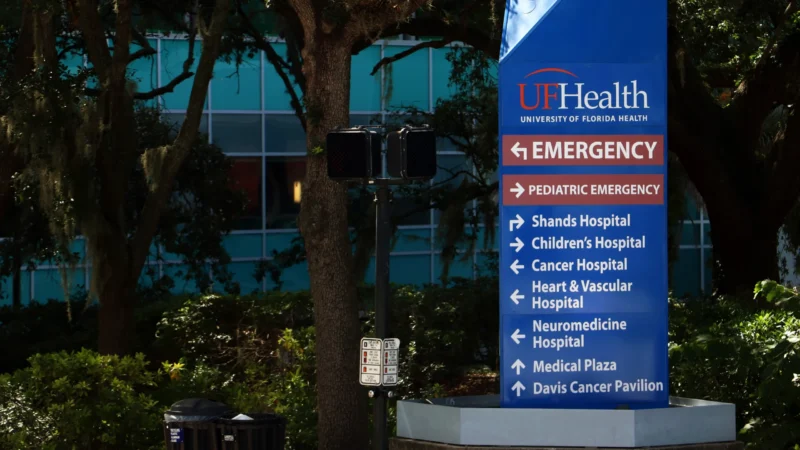A new law in Jacksonville will prohibit the projection of unauthorized signs or messages onto public or private buildings without the owner’s permission, a reaction to a string of antisemitic displays around Jacksonville.
City Council approved the legislation 18-1 on Tuesday after an emotional debate about which of two identical bills to consider.
Now comes the question of whether the law can pass muster under free speech laws.
Any time the government tries to restrict speech, especially political speech, the legislation has to be narrowly tailored, said Jacksonville attorney Edward Birk, who handles communications, copyright and labor and employment cases among others. That means the bill has to mandate “only the minimal restriction necessary” to accomplish the compelling interest, he said.
Antisemitism “certainly doesn’t reflect well on our city, and it doesn’t reflect the attitude or ideas upon whoever owns the buildings that are being used as projections screens,” he said. “So what’s the harm, and what’s the interest in government to restrict that? Basically I think it’s going to be an uphill battle for the city, if this is challenged in court, to demonstrate the compelling need.”
But while the bill appears to be “content-neutral,” Jacksonville University law professor Courtney Barclay said it remains to be seen if a legal challenge could be presented against the legislation. The law does not regulate the content of the speech projected on anything, or what the projections show, so that generally withstands constitutional scrutiny, even if it does incidentally restrict speech or the right to protest, she said.
“One of the challenges courts would look more closely at with these particular bills really comes down to the fact that it does not discriminate between public and private property, and particularly where it prohibits projections on streets and sidewalks, and the exterior of public buildings,” she said. “That really creates a challenge because those are generally what we would call public forum spaces where people have a right to express themselves as long as they are not defacing property.”
The intent behind the law
Two identical bills were introduced for council members to consider — one submitted by Council President Terrance Freeman and another by council members LeAnna Cumber and Matt Carlucci. Both were born within days of a swastika and cross being projected onto the Downtown side of the CSX building on Water Street.
That display followed antisemitic statements projected onto an outside wall of TIAA Bank Field as well as a Downtown apartment building during football games in October. Antisemitic banners also were flown from a nearby highway overpass.
Other protests have surfaced with repeated airplane banners flying over TIAA Bank Field and Downtown, in support of Confederate monuments that many demand the city remove.
Law enforcement officials have said there was little they could do about the banners and projected displays because they are protected as free speech. Then came the bills, which address only “unauthorized signs” and not their content, with no mention of prohibiting racially insensitive or hate speech.
The bills both said that a property owner may project a sign onto an exterior portion of his or her own property if it “does not otherwise violate applicable sign regulations.”
If someone else projects anything onto a building or public space without the consent of the owner or person in control of it, the projection “shall constitute blight and graffiti,” the law says. Either violation would become a second-degree misdemeanor punishable by up to 60 days in jail, a fine not less than $2,000 and confiscation of any equipment or vehicles used in the projection.
When he announced his bill Jan. 19, Freeman said that hate has no place in Jacksonville. While the bill “won’t change the hearts and minds of those who spew hate,” he said it complies with the First Amendment because it does not base prosecution on the content of the message, but whether the projection has the owner’s consent.
Later that morning, as Cumber discussed her bill, she said it would show that Jacksonville will not allow these messages anymore, adding that these “evil antisemitic messages” displayed throughout Jacksonville are starting to spread around Florida. A swastika and other messages glowed on an AT&T building in West Palm Beach on the same night as the CSX display, according to CBS12.
Birk, the jacksonville attorney, said political speech is the core protection of the First Amendment. But the comments about attacking antisemitism could come back to haunt the city if the bill were ever challenged in court — even if the bill itself says nothing about Nazis or antisemitism, Birk said.
“Those comments are very likely to be presented to a court as to say, ‘Look, the ordinance has this neutral language, but let’s look at the background, what prompted this statute and let’s look at what people had to say about it,'” Birk said. “Whether those background comments are enough to warrant striking down an ordinance remains to be seen.”
Barclay, the JU law professor, agreed that the statements from Freeman and Cumber could be looked at in a legal challenge if it was seeking the intent of the law.
“What’s really going to be important is how the bill is written, and it really does seem to be content-neutral, and also the application,” Barclay said. “If the enforcement of those was very one-sided, very targeted toward particular viewpoints, that would really raise those concerns.”
Birk also said that there is precedent for similar types of regulations, pointing to a 2015 Supreme Court case of Reed versus the town of Gilbert Arizona, which detailed guidelines for municipalities to regulate signage.

Which bill came first?
Council spent some time debating which of the two bills to consider. Freeman’s bill appeared first on the agenda. After it passed, the other bill was withdrawn.
At her news conference Jan. 19, Cumber said she believed her bill, submitted before Freeman’s, would come ahead of his on Tuesday’s agenda. It would be “pure politics,” she said, if her colleagues voted down her bill, which she called “so critical and important” as well as identical.
But that was not the case Tuesday night, as Freeman bill number was just above Cumber’s on the agenda, both listed as emergency bills for immediate action by the 19-member body.
Councilman Rory Diamond, one of 14 who supported Freeman’s bill, said the bill was content-neutral and did not attack any specific kind of speech. So he pushed for the emergency approval.
“Given that our city is under attack and that it is consistently getting those antisemitic messages on our stadium, on public and private buildings, that we need it moved as fast as possible with one unified voice,” he said.
Freeman spoke out about the debate over whose bill was first, a discussion that he said distracted from the city’s stand against hate messages.
“It’s a shame instead of focusing on that message and sharing that message as loud as you can, you are choosing to go to a narrative of council members arguing and fighting over who came across it first,” Freeman said. “I said, that’s discouraging. … I wanted to show the city as a unified front, and we did.”
Freeman asked assistant general counsel Mary Staffopoulos a litany of questions to show how his bill ended up ahead of Cumber’s on the agenda legitimately, saying “for anybody to think I stole somebody else’s legislation” is wrong,” and that he had worked through council rules to file it. He also amended the bill to list all those who approved it in alphabetical order.

But Carlucci, who cosponsored Cumber’s bill, questioned why a bill prepared by the general
counsel, then serially numbered in the order that it was received, was “subverted” by Freeman’s bill.
“She filed the bill first; she was working on the bill first; she did the heavy lifting. This is not a political statement. It is about what could happen to any one of us up here if we file a bill and somebody jumps ahead of us,” Carlucci said. “That is not right; that is not fair, and our council rules are supposed to make for a level ground for all of us.”
Councilwoman Brenda Priestly Jackson said she would not support either bill, even though she understood their spirit and stood against any form of antisemitism, racism or bigotry. She asked that her name be taken off Freeman’s bill, saying the bills exemplify a “double standard” as another challenge still awaits City Council action: the removal of Confederate monuments from public property.
“We rallied very quickly to address this, and we made promises when we were going to address issues of ethno-racial reckoning, and we have not have not fulfilled those promises, a failure to take down the Confederate monuments,” she said.
9(MDEwNzczMDA2MDEzNTg3ODA1MTAzZjYxNg004))







